From Qinghai Lake to Tongren, Xi’an and Beijing, Sounds of China
In August, 2010, I received my invitation to the 3rd Qinghai Lake International Poetry Festival and a year later arrived in China with my wife Meredith on August 6, 2011. We spent a night in Beijing and arrived the next day in Xining, where we stayed at the Qinghai Hotel and met Jidi Majia, the Head of the Information Department for Qinghai Province and the man who envisioned and organized the festival.
I carried a small Sony .mp3 recorder and recorded many of the sounds we encountered during our visit, which included interactions with festival poets from around the world (54 nations were represented), as well as a tour of Tibetan cultural attractions in Qinghai, a visit to Xi’an which included a featured reading at the Chang’an Poetry Festival, the terra cotta warriors and a visit to the Poetry Department at Capital Normal University in Beijing.
Poets are treated with a great deal more respect in China than in the United States and the Chinese people we met really respected Americans. One cab driver said that the world does not know the history of China and he’s quite right. I learned matcha tea originated in China and that the original cut-ups using lines from failed poems were not done by surrealists, but by the late T’ang-era poet Li He.
From our first night in Beijing, we were amused by what our guide (& my translator) Denis Mair called Chinglish. Essentially it’s a poor or mistranslation of English into Chinese.
8.7.11 – Sign in Beijing’s Guigo Hotel bathroom warns: “Be careful of landslide.”
The paper I presented at the festival was Pacific Rim Poetics, noting how (among other things) North American West Coast poetry owes more to Asian and Native American cultures than to Europe.
There was some confusion as to how I would make my presentation, but what eventually happened was that I read from a short version of the paper and showed most of the powerpoint and Denis Mair translated on the fly. Here’s the sound of our talk:
http://www.globalvoicesradio.org/audio/8.8.11_Pacific_Rim_Poetics_PN_&_D.Mair.mp3
Denis told me that he had received some help from native Chinese speakers regarding the translation of my Elegies for Slaughter into Chinese. About the poems, Denis’ friend Shu Chi said “He has a way of creating structure that gives abundant detail.” The Chinese version of Elegies for Slaughter is here.
Jidi Majia is the head of the Qinghai Dept of Information. The visionary behind the conference, he gave a copy of his book, in English and Chinese, to all festival participants and autographed my copy. (We had our copy shipped home and I plan on posting on his work upon its arrival.) This sound is Denis explaining what Jidi Majia wrote and the 2nd part is a poet from Nepal, Manjul, learning how to pronounce Meredith’s nickname, Almondina. http://www.globalvoicesradio.org/audio/8.8.11_Denis_Explains_Jidis_Inscription_&_Junmal_on_Almondina.mp3
On the first day I also recorded the presentations of Javier Bello of Chile and Mai Mang(Li Bin) of China, who is now teaching at Connecticut College, among other people. Mai Mang’s talk was entitled: In Search of the Absolutely Blind Encounter.
Our guide for the road trips we took to Qinghai Lake and Guide County went by the name Coco, because she loves coconuts. Here are a couple of examples of her bright announcements to the gathered poets on the poetry bus. 1. Coco Bus Announcement. 2. Coco Bus Roll Call.
Chinese government officials LOVE to have official dinners and once the barley liquor starts flowing, you never know what some of them will do, including singing opera.
This is some of the Tibetan Buddhist chanting I recorded at a Qinghai shrine.
Here is Coco’s introduction to the Temple of the Jade Emperor.
Javier Bello read a poem (en espanol) at the bar, which was very smoky thanks, in large part, to Javier himself.
Much time was spent on buses during the festival, eight hours in two days is our estimate, so there was much time to interact with other poets. Mehmet Yashin is one of them. A native of Cyprus, living in the U.K. and representing Turkey, here he explains about a certain fruit he bought near the Temple of the Jade Emperor.
My opportunity to read at the Festival came at a place with the most amazing scenery, at the Qinghai-Guide National Geological Park. The mountains here are like Red Rocks, but with different shades of color, including a deep red. I was chosen to end the reading, which was in an outdoor setting with temperatures in the 90’s. Denis Mair was kind enough to translate Elegies for Slaughter into Mandarin, and I chose to read the last one. I was grateful to have Sun Xiaoya, an Associate Professor at Capital Normal University read the poem in Mandarin. She works at The Research Center for Chinese Poetry and toured that before our visit ended. The entire reading from that day is archived here.
We had the opportunity to tour one of the most important Tibetan Buddhist Monasteries in China, the Kumbum Monastery (Ta’er) outside of Xining. It was built in 1583 and the Wikipedia entry says it is only second in importance in Tibetan Buddhist to the monastery in Lhasa.
My reading of the introduction is here and the sound of the ticket counter is here. I found that sound quite hypnotic and interesting. This is the sound of some chanting and drumming by monks there. Sounds of our tour, led by the very sweet Coco, are here. Denis had a very interesting experience there, which he explains here.
The festival ended and we had a day to relax before we were escorted by two of Jidi Majia’s men and a driver to Tongren, the heart of Qinghai’s Tibetan population and home to some remarkable Tibetan Buddhist Thangka painting. These are devotional paintings. We toured a Thangka Museum and there are several segments of the tour that I recorded: Segment one, segment two, and Thangka thoughts from Denis Mair.
We were also treated to a remarkable Tibetan meal at a small restaurant. It was the best meal we had in China and, ironically, the one we feared the most. Meredith had me drag along about 25 protein bars and I ate about three of them and hauled them back home. There was Tsampa (made from barley, je (female yak) ghee, je cheese), shan n yu (pea gelatin), the freshest corn I have ever had, dried pot potatoes (gan guo Yang Yu), bbq lamb, bracket fungus harvested from local trees, green tea with wild Qinghai rose petals, a slice of peach and chrysanthemum and tea made from a solar heater that directed several small mirrors at a point where the kettle was placed. Soup and Je yogurt finished it off because in China they say “soup scrapes the oil.”
So these are three stories from that experience with our guide who is an expert in Tibetan culture, Dr. Hua. Tea in the Tibetan restaurant. I saw two hornet’s nests up near the roof of the outside dining area, where we were. Rather than try to take them down, or spray Guaranteed Kill insecticide, the local see hornet’s nests as good luck omens and believe hornets are good for removing spiders. This is my summation of a story prompted by the hornet’s nests. Denis tells the story of the restaurant, the altar and the photo on the altar which is the Dalai Lama. We were surprised to see this, but it was not the only occasion.
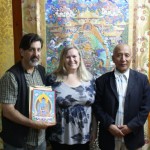 By evening we were introduced to a Thangka master, Master Douga. There are two segments recorded at our meal and one recording where he offered us one of two different small Thangka paintings, one of which, the Medicine Buddha, is now on our altar.
By evening we were introduced to a Thangka master, Master Douga. There are two segments recorded at our meal and one recording where he offered us one of two different small Thangka paintings, one of which, the Medicine Buddha, is now on our altar.
This is the sound of part of a thunderstorm in Tongren.
This is sound from a tourof the Longwu Tibetan Buddhist Monastery, where they have a huge sculpture of Manjushri. He is the bodhisattva associated with transcendent wisdom, which he enables by cutting away ignorance with his sword. The monastery is where I bought a Manjushri pendant for my altar. Our tour guide left academia for a position at the monastery and says she is interested in female Tibetan Buddhist deities, Quan Yin among them.
I was having some issues dealing with the altitude, heat and with dehydration. I asked to visit a Tibetan doctor and he took my pulse and asked if I had a weak heart or a history of heart trouble! Not that I know of, but being sick and jet-lagged and nearly suffering heat stroke did not help, but here’s a recording of that encounter, most of which was viewed by three interested Tibetans in the doorway of the small clinic.
The reason we were in Tongren was because I asked Denis to see if he could coordinate a visit where we could investigate Tibetan Bön culture. I had studied what was billed as a variant of this ancient wisdom culture for a few years, but going to a region that is dominated by people of Tibetan ethnicity, I wanted to go to the source.
We drove for two hours along very poor roads (some of the worst roads in a country with mostly good ones) and then to a valley. The Bon Gya Monastery was up on the hill in an incredible setting. We got a tour from Monk Soten, who is studying English and is developing the monastery’s website. (He would LOVE a Tibetan-English, English-Tibetan dictionary!)
He was carrying a cellphone on him and later Monk’s came by headed for lunch, lugging a case of Pepsi. Several young monks wanted into the photos that we took with Bongya Gelek Lundrub Gyatso, the Bon Gya Lama Rinpoche. A dinner one evening in Tongren featured the very tasty Huang Guo Jiu (yellow fruit wine, a local treat), naked fish (a fish without scales) and pig’s ear. It looked like proscuitto. Smokers are abundant in China and Mer had little tolerance for them due, in part, to her pregnancy.
Back in Xining, we visited the Tibetan Medicine and Culture Museum. There, we saw the longest Tibetan Thangka painting in the world and were stunned. It was almost overwhelming. I sat in front of the portion that honors the Founder of Bön for a moment. Denis translated Tibetan medical metaphors. In the evening, we were feted to something resembling a state dinner with Jidi Majia and others from his office. He told me my paper on Pacific Rim Poetics was well-received and asked if I would be interested in attending a conference on indigenous poetry in October 2012 in Sichuan. Of course. The museum visit prompted this poem:
Names of Thangka Deities or Chinese Dishes
Naropa; The Blue Unmoved Lord of Mysticism; The Thunderbolt of the Wheel of Time; Paragraph Corn Milk; The Avalokiteshvara who Saves from Eight Fears; Avalokiteshvara who Howls Like Lions; Cucumber Mix Bowel; The Consort of the Tantric Deity Who Responds to Prayer; Buddha with 1000 Hands and Eyes; Iraqi Surface; The Goddess of Fixed Light; The Red King of Clan and Goddess of Flaming Light on Green Horse; Salt Baked Chicken Claw; Going up to Brahma by Riding a Crane; Moto Burn Fingers Keel; Demon-Catching Guardian Spirit; Tribe King of Ghoul; Connected to Flesh & Blood; Gon-po: The Incarnated Guardian of Compassion; The Mother of Evils; Meat Package; The Goddess w/ Flaming Wings; The Four-Faced Guardian of the Fierce Look; Sleeve Fish w/ Soy Sauce in Casserole; The Four-Faced Guardian of the Free Mind; Dainty Frog Meat; The Destroyer of Death; Pungent Beef Pizza; The Horse-Head Lotus Deity; Cow Stomach Salad; The Fierce Vajra Who Takes Control of Unclean Places; Crispy Pimp.
7:50A – 8.18.11
One of my favorite evenings during our trip was when I was honored guest at Chang’an Poetry Festival #69. The name of the group is slightly tongue-in-cheek, as it’s a group of ten or so poets, and this was the 69th gathering of the group. We started the evening eating a meal called Yang Rou Pao Mo, or shredded bread soaked in mutton stew. I shredded one biscuit and took good notes, which I turned into:
How to Eat Yang Rou Paomo with the Chang’an Poetry Festival
1) Break up the bai bang into pieces not bigger than “the head of a fly.”
2) Choose mutton or beef. (Mutton.)
3) When someone across the table asks you to pass the Pepsi, put the liter right in the middle of the zhuan pan watch it spin around out of reach.
4) Don’t let your cigarette ash fall into your bowl.
5) Start w/ an appetizer, fern, pickled garlic, peanuts, soybean or cabbage.
6) Crack the pickled garlic w/ yr teeth let the sound erupt in yr mouth like an avalanche or tree being felled.
7) When the yang rou arrives try pepper sauce or coriander try pickled garlic. Savor every noodle.
8) Finish the Tsing Tao Draft & head across the street to the reading.
Chang’an is the historic name of Xi’ an, the capitol of T’ang Dynasty era China and a growing world-class city. The Chang’an Poetry Festival is run by Yi Sha and Qin Bazi. He greeted me with a poem that was later posted on the group’s blog. My sister Barb did an on-line translation of the page and selected out the poem that was written in my honor by Qin Bazi, using results from an internet search, a method similar to the Flarf movement in North America. Here is the auto-translation, which has many elements I remember from Denis’ instant translation:
Second, children welcome poem Qinbazi
Qinbazi child to a new work, “Paul Nelson” as a welcome speech, the poem is as follows:
“Paul Nelson”
(Poetry /Qinbazi child)
Paul Nelson is coming
Rather, at the moment in Xianyang airport landing
I hastened to the Internet to do homework
Baidu search with his name
He is an architect of the last century, 1895 was born in Chicago
And Hemingway, Ezra Pound is a friend, this is really too old
He is an unknown Chinese artist of the students in the United States
He is the one called “speech Bible” author of books
They are the 2008 -year NBA player Paul and Nelson
He is what?
But he should first of all a poet
But tell me does it happen that Baidu search
I think probably because he did not participate in the auction ranking it
This number is a bit embarrassing
But I still elsewhere, he got a bit of information:
Paul Nelson, poet, teacher, radio host
I interviewed Allen and Jerome favorite
His poem “Elegy killing the town,” I just read
He is the President of the Association of Washington’s poetry
(Estimated this job and my Poetry Festival Chairman same level?)
With his wife and his friend the poet and translator
Little giant like basketball through Medan in China
Chang Poetry Festival tonight will be the guests
I was wondering how to write a popular poem
Paul Nelson has come to live next door
(2011 years 8 months 18 Thursday afternoon)
I recorded the whole festival in part one and part two. I did a shortened version of my Pacific Rim Poetics power point presentation and was fascinated by some of the imagery and topics the members of this group covered. They read from the youngest to the oldest and are reading Charles Bukowski among other poets. Some images, notes I recorded:
Sleeping in the stomach of darkness
Pregnant ghost
Wind blowing horses into existence
Global map of breast sizes
KFC chicken feathers plinking onto the floor
Nabokov’s butterfly
The King of the Gobi Desert likes to blow up the cow bladder (is a braggart)
The bookshop owner’s fear – bookstore as morgue
The lips of the cut come together in a kiss
Livid red wheat
My ideal reader: a drunk Russian
The told me that my poetry is striped and spotted and that was a compliment.
Yi Sha has a Selected Poems in English, translated by Denis Mair and OuYang Yu, who was at the Qinghai Festival and lives in Australia. Here is one selection:
Poetic Eavesdropping
A secret microphone shaped like a sugar cube
Has been placed in your cup of coffee.
The eavesdropper, up to his little tricks
Hears the dragon king slurping up ocean water.
While in Xi’an we visited a shrine to Du Fu, which is in a state of disrepair, the City Wall of Xi’an, akin to the Great Wall and the Great Goose Pagoda, which goes back to the 700’s and the T’ang Dynasty.
Here are some of the American Sentences I wrote during our visit, some of which allude to activities above:
8.7.11 – Sign in Beijing’s Guigo Hotel bathroom warns: Be careful of landslide.
8.7.11 – The Swedish poet has a breakfast of coffee and watermelon.
8.7.11 – Are you carrying any items on the dangerous good chart?
8.8.11 – At the banquet he said: It’s the best cow stomach salad I’ve ever had.
8.9.11 – Pass on donkey meat ‘cuz I did not come here just for a piece of ass.
8.9.11 – They board w/ Tibetan Cowboy hats, activate Good, Bad & Ugly ringtone.
8.9.11 – The husk of the sunflower seed she spits flies in the Qinghai wind.
8.10.11 – Venemous Goyas are skanky and constantly melodramatic.
8.10.11 – Outside the temple garbage truck comes, plays “We Wish You a Merry Christmas.”
8.10.11 – Smudged by the smoke of the incense in the Temple of the Jade Emperor.
8.10.11 – Hawks above the hill and the stairs to the statue of Quan Yin – Nanhai.
8.10.11 – Tour the Yellow River watershed before the river turns yellow.
8.10.11 – Dinner of Moto Burn Fingers Keel, Hanamaki and Crispy Duck.
8.11.11 – Qinghai Thursday lunch dishes: Connected to Flesh & Blood, Meat Package.
8.12.11 – Qinghai Hotel dessert – they opt for Haagen Dazs, pass on Crispy Pimp.
8.13.11 – Two Xining Swat team cops w/ smart phones try to help me find you piao. (Yo Pe Ow, postcards.)
8.13.11 – His Muslim beard points down as he turns over the field – til wind blows.
8.14.11 – Huge blue terracotta Longwu Manjushri festooned w/ human and tiger skin.
8.15.11 – The Xining vendor tells us the popsicle is “popsicle-flavored.”
8.15.11 – Tibetan herding his goats down the road w/ motorcycle & switch.
8.15.11 – Smoke blows from the Bon Gya Monastery – monks head to lunch / case of Pepsi.
8.15.11 – How brown the Longwu River but not the creek by the monastery.
8.16.11 – After 8 days in China even my excrement looks like dragons.
8.17.11 – The Thunderbolt of the wheel of time can’t stop traveler’s diarrhea.
8.18.11 – The grandma who develops a relationship with coffin wood.
8.19.11 – On the room service menu: salt baked chicken claw – we order seven.
8.20.11 – Spider web outside Du Fu shrine catches raindrops, bits of cedar.
8.20.11 – The snails climb up the walls of the shrine of Du Fu in August rain.
8.20.11 – Even the cedar caught in the web outside Du Fu’s shrine – calligraphy.
8.21.11 – Ganfu (tea ritual) in De Fu Alley one last hit of Xi’an.
8.22.11 – She naps next to her large bottle of Coke, incense ready for Buddha.
8.23.11 – Get high on the Great Wall above the buzz of cicadas – his phone rings.
8.23.11 – Bumbleboo on the Great Wall in his death throes w/ a watershed view.
How can one sum up a trip like this? Transformative, no doubt. We gained tremendous respect for Chinese culture which one Beijing cab driver said is poorly understood by the rest of the world. He’s right and certainly we hope to return. Learning that matcha did not originate in Japan, but in China and that cut-ups were first used by the obscure “Ghost Poet” Li He during the T’ang Dynasty were but two of the many examples of how Chinese culture was way ahead of the Europeans, but many scholars have written with much more eloquence about this. I guess I’ll stop at one last American Sentence, written after our return:
8.27.11 – Our China motto: “Leave no Tibetan Prayer wheel unturned.”
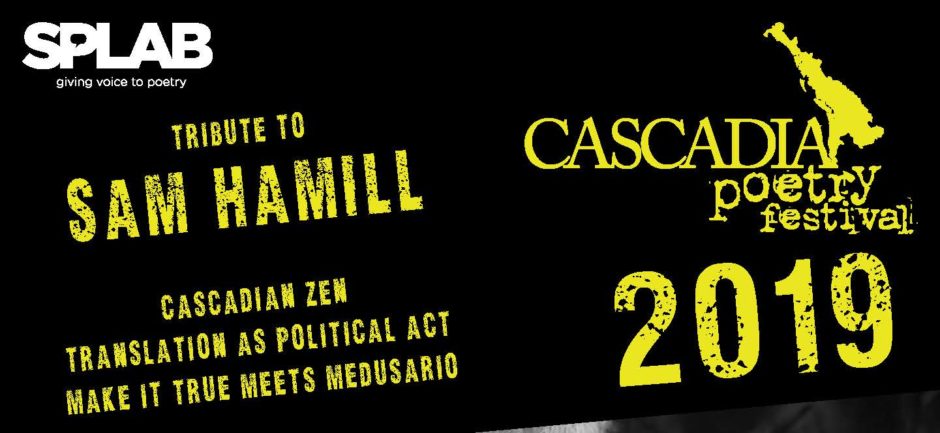
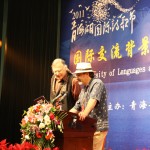
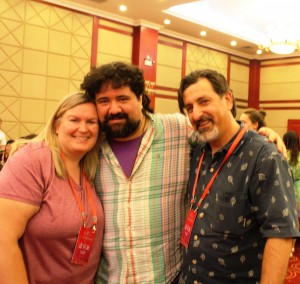
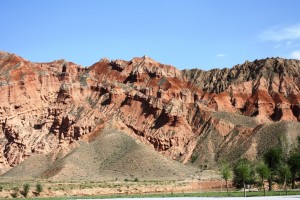
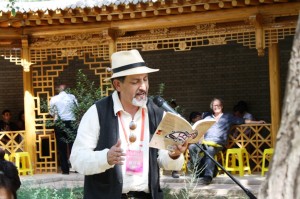
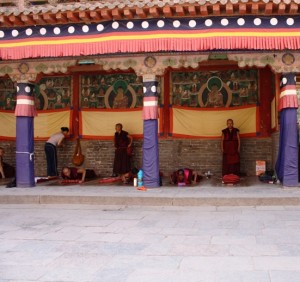
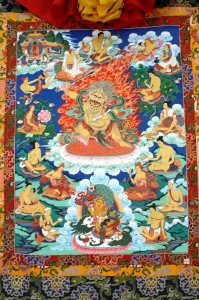
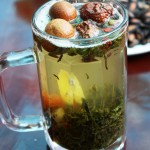
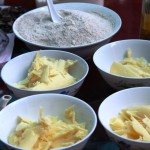
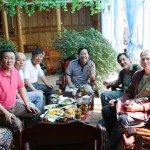
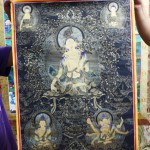
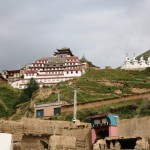
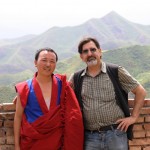
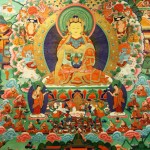
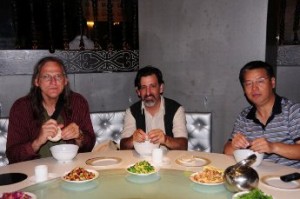
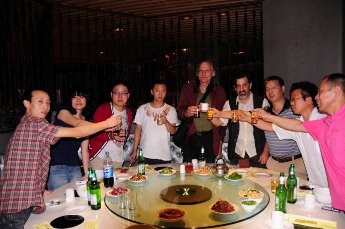
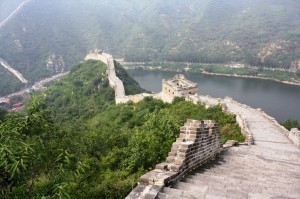
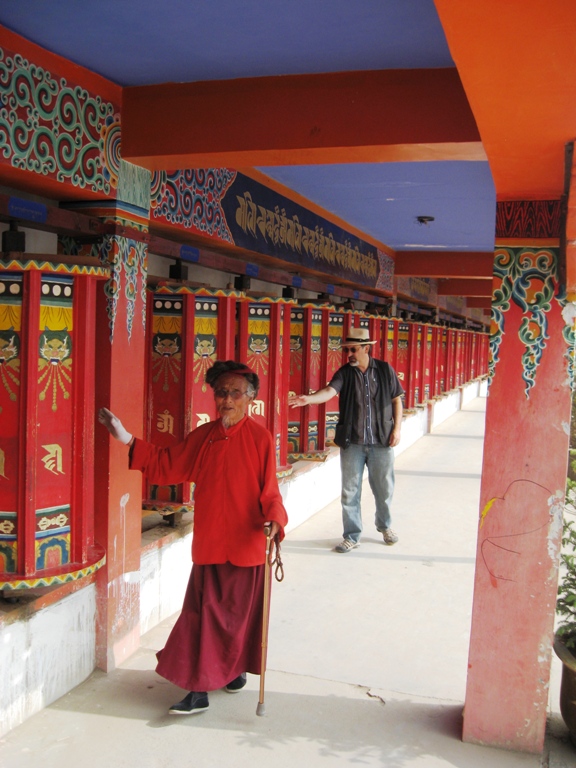
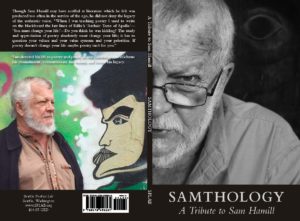
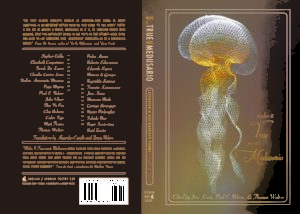

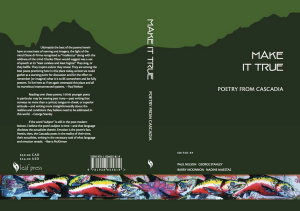
Great descriptions, Mr. Nelson.Enjoyed it.
Subroto Bondo
New Delhi, India.
Hello, i am very happy saw that news, thanks. Soten